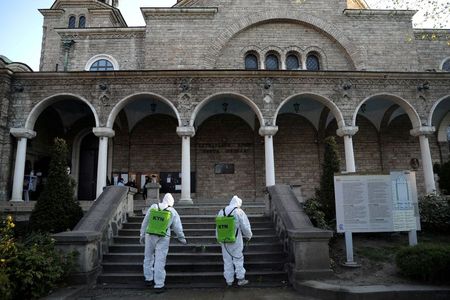SOFIA (Reuters) – Bulgaria will start large-scale testing for COVID-19 infections after securing sufficient test kits, easing a serious shortage, Health Minister Kiril Ananiev said on Wednesday.
The Balkan country, which has confirmed 747 cases of the coronavirus and 36 deaths, has been testing only people deemed most at risk of infection, saying it lacked enough test kits to cover larger groups in the nation of 7 million people.
Sofia has closed schools, restaurants and bars, restricted inter-city travel and access to parks and urged people to stay at home to contain the highly contagious lung disease since the middle of March, and Ananiev said the measures have worked well.
Bulgaria has the lowest number of known cases and the third lowest number of deaths from COVID-19 per 100,000 inhabitants in the European Union, according to European Centre for Disease Prevention and Control data published on Wednesday.
But critics say only widespread screening will reveal the actual spread of the infection and allow the government to come up with a sensible plan for when and how restrictions could be eased and a recovery plan for the economy drafted.
“We will start massive testing of Bulgarians,” Ananiev said during a visit to the ski resort of Bansko, which was sealed off for 14 days last month over a coronavirus outbreak. Health authorities have begun testing its residents.
Anasiev said Sofia had secured some 20,000 polymerase chair reaction (PCR) test kits and was awaiting delivery of more from South Korea as well as from local and foreign donations. Some 18 laboratories across Bulgaria were equipped to carry out both rapid antibody tests and the more reliable PCR lab tests.
Ananiev did not say how many people had been tested to date. On April 5, the health ministry said some 15,900 tests had been carried out since the pandemic outbreak in March.
Over 70,000 Bulgarian have lost their jobs due to the coronavirus partial lockdown while many factories have halted or restricted operations amidst a plunge in consumer demand.
(Reporting by Tsvetelia Tsolova; Editing by Mark Heinrich)


